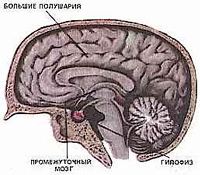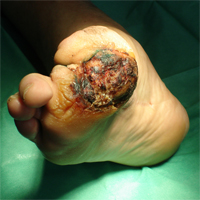Hyperprolactinemia in women is a disease associated with a high content of the prolactin hormone. Hyperprolaktemia: symptoms, treatment, signs and diagnostics - let's consider Read more.
Content
This disease
Young women arising at the age of 25-40 years old can be observed in 40-50%
Cases of infertility and 10-20% with amenorrhea, more often after childbirth or abortion. What
May be the cause of the development of hyperprolactinemia in a young healthy body?
The answer to this question should be sought from specialists: endocrinologists,
gynecologists, mammologists, ophthalmologists and therapists. Causes can be divided into
4 groups.

- To the first group of causes of hyperprolactinemia in women should include chronic infectious diseases of the brain, such as
meningitis, encephalitis, as well as traumatic injuries that have a negative
Impact on the state of the hypothalamus. - The second group is characterized by violation
The functions of the pituitary gland due to the occurrence of tumors of various etiology,
Syndrome «Empty Turkish saddle» in which X-ray diagnostics gives
Picture of degenerative dystrophic change of pituitary. - In some cases, prolactin hyperproduction
Provocates hypothyroidism — Reducing the function of the thyroid gland, syndrome
Polycystic ovaries, hormonally dependent pathology Genital — myoma
uterus, endometriosis, as well as chronic hepatitis, slimming deprived or progressive
renal failure. - Often young women are distinguished by selfless
love for receiving various drugs having such a side
Effect, as an increase in the level of prolactin, is the fourth group of reasons -
Contraceptive, antidepressants, high estrogen medications.
Features of women with hyperprolactineia
Before
everything should be noted that externally women with hyprollactinemia do not differ
from healthy peers. Symptoms of the disease are manifested in the form:
- Disruption of menstrual cycles — failure
Lutein phase, no ovulation, oligomenorage, amenorrhea; - infertility;
- Galactere — Anomalous milk allocation of breast milk
glands; - Frigidity and reduced libido;
- Girsutism — hair growth in male type;
- acne — inflammation of the sebaceous glands;
- metabolic problems — osteoporosis,
Obesity, hyperinsulinemia, various psycho-emotional disorders.
Besides
The symptoms of primary hyperprolactinemia are distinguished when
Speakers all the features described above. As the process progressing
The genital hypoplasia is joined, their dryness is observed with difficulty
intercourse, lack of orgasm, hypertrichosis. Clinical manifestations are secondary
hyperprolactinemia are determined by the symptoms of the underlying disease.
Diagnosis of hyperprolactiakiyia
It is carried out in stages:
- blood test for prolactin and sex hormones;
- X-ray skull in the area «Turkish saddle»;
- CT and MRI brain.
Differential
Diagnosis in syndrome
Hyperprolactinemia in women includes identification:
-
Adenoma
pituitary - prolactinoma;
-
tumors
parasellalar field; -
Bronchogenic
cancer; -
Syndron
polycystic ovary; -
Chronic
diseases of small pelvis; -
Physiological
or pharmacologically conditional form of the disease; -
Primary
hypothyroidism; -
Zirroz
liver; -
Chronic
renal failure.
Hyperprolactiakiyia syndrome
among women

Treatment
hyperprolactinemia is usually carried out by therapeutic methods with
using drugs that normalize the content of prolactin in the blood and
restoring the menstrual cycle taking into account the form of the disease and state
women:
- infertility and functional
hyperprolactinemia; - infertility and microprolactinoma;
- pituitary tumor;
- Secondary form of hyprollactineyia.
Therapy
This syndrome is carried out strictly according to the readings of dopamine stimulants
receptors and hormonal drugs. With a non-hydrogen-shaped disease treatment
lies in the abolition of drugs or other harmful factors.
Surgical
Intervention is rarely applied, usually based on the recommendations of the ophthalmologist
with a significant violation of visual acuity and in the case when the effect does not occur
From therapeutic treatment. Additional radiation therapy is shown in connection with
hypothyroidism or renal failure.









